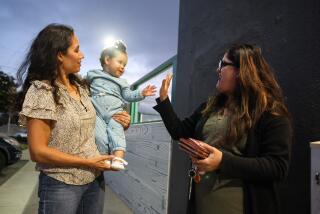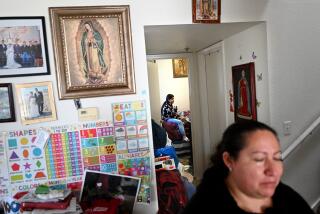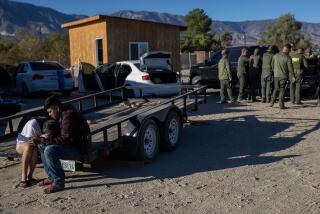Clinic Hits the Road to Fight TB
- Share via
As tuberculosis rates continue to climb among the country’s immigrant population, a St. Joseph Hospital clinic that provides health care to Orange County’s farm workers plans to step up its efforts to test for the highly contagious disease with a unique mobile X-ray service.
With help from the county’s Health Care Agency, Puente a la Salud (Bridge to Health) will soon offer X-rays that are used to determine whether tuberculosis is active in patients who test positive for the disease. A skin test determines if the person is positive for TB; an X-ray tells whether the disease is active. A person with an active case is highly contagious.
Although the number of new cases of tuberculosis in Orange County has steadily decreased, health workers believe the number of immigrants with the disease has increased. The federal Centers for Disease Control and Prevention said that from 1993 to 1998, the proportion of U.S. cases for foreign-born people increased to 41.6% from 29.8%. In that period, 131,377 new cases overall were reported in the United States. In Orange County there are 267,000 people who have tested positive, a health care official said.
Although X-ray machines have been used on mobile vans that serve the county’s poor and uninsured, Penny Weismuller, division manager for disease control at the Health Care Agency, said she doesn’t know of another service providing X-rays on Sundays and that tests specifically for tuberculosis.
“It’s our way of reaching out to people who by the nature of their employment can’t get paid if they [take a day off to] get a skin test,” she said. “By working with Puente, they have a sense of trust. . . . The patients would be concerned about coming to an official entity. These people are in our community and we can help them.”
Rocio Nunez-Magdaleno, director of Puente a la Salud, said she asked the Health Care Agency to pay for the X-ray service after she saw that some workers who tested positive did not go for follow-up X-rays. The workers would forgo the follow-up because the tests were far from their homes and they lacked transportation. Most of all, they did not want to miss a day’s pay.
“It’s not just something that affects farm workers. It can affect everyone, their kids who go to school with other kids,” she said.
Puente is part of St. Joseph Hospital in Orange, which operates mobile clinics in central Orange County, two of which serve agricultural workers, including the migrant barracks at the California Labor Camp in Irvine.
Puente offers $5 consultations to any of the estimated 89,000 farm workers in Orange County, most of whom are Spanish-speaking and earn as little as $750 a month, Nunez-Magdaleno said.
Farm workers are vulnerable to tuberculosis because “they live in very close quarters,” she said. “There is malnutrition and other illness. Because of the poverty, a whole family may live in one room. Those conditions lend themselves to this illness.”
Puente workers have found that about 50% of the farm workers test positive for tuberculosis, she said. The disease is spread when a person with an active case coughs, speaks or even sings. The airborne germs reach the lungs of another person whose immune system usually fights the infection. In most cases, tuberculosis remains dormant and the infected person cannot spread the disease.
However, it can become active if the immune system weakens. The tuberculosis bacteria then multiply and attack different parts of the body. The symptoms vary but can include coughing up blood, weakness, weight loss and fever.
Farm workers who test positive can take medicine to prevent the disease from becoming active but X-rays are the only way to be sure which stage it is in.
The mobile clinic is a long motor home equipped with everything a doctor’s office might have, plus dental services. On weekends, it travels to the Delhi Community Center, other community centers and to locations such as the California Labor Camp, the county’s only farm worker housing facility.
Men in stiff white shirts, large belt buckles and pointy cowboy boots approach the clinic door with ease and speak in Spanish with nurses and aides.
Jose Estevez, a 43-year-old native of Guerrero, Mexico, said he, his wife and three children all were tested for tuberculosis recently.
“They say it’s common to get a positive result. I was scared because I really came here to work. If I’m sick, what good am I?” said Estevez, who earns $5.75 an hour picking strawberries and works about 54 hours a week to make $310.
Weismuller said, “The good news is the people are not spreading the disease. But they are at risk of developing TB. We can reduce that risk, from 10% to close to zero. We really want to identify people who have new infections.”


